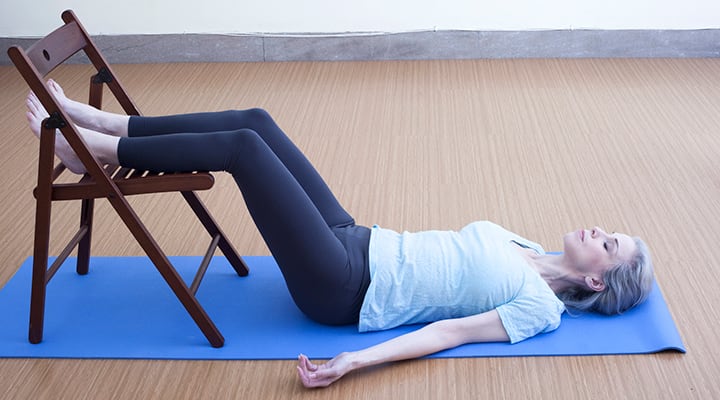
Am I Overtraining? 15 Recovery Tips
Published: December 2022
We all know that hard work helps you succeed and become the best version of yourself. This is certainly true when it comes to exercise. Whether your fitness goals are to build strength, improve endurance, weight loss, improve your physical appearance, or even live longer, it's admirable to make time for training at the gym, going all out in your Zumba class, or logging miles on the track after a long day at work.
However, too much physical activity without sufficient time for resting and recovering can hinder your performance and possibly even harm your health.
So, how do you know if you're overtraining? This article will help you the recognize signs and symptoms of overtraining syndrome and provide tips for muscle recovery.
What is overtraining?
As the name suggests, "overtraining" is fitness training in overdrive—you're working out too intensely, too frequently, or both, without enough rest in between sessions. Now, don't get us wrong: it can be beneficial to push yourself when you're working out; experts often encourage a concept known as functional overreaching, where you push beyond normal limits for your body to adapt to the higher training loads to achieve better gains.
But issues arise when you enter a phase of non-functional overreaching, which means that you are no longer receiving the normal benefits of exercise. When there is not enough recovery time between workouts, you might notice that your performance is failing to improve, and you may also have more fatigue. You may notice that you are exhausted, have lost enthusiasm for your workouts, or are becoming more prone to injury or illness; in other words, you are burned out. These are the warning signs of overtraining (and no, it doesn't just happen to elite athletes). In more extreme cases, you may experience overtraining syndrome, in which you become more susceptible to an increased rate of illness or sports injuries.
What does overtraining do to your body?
Overtraining can affect your mind, body and soul. Let's start with your immune system. While the literature shows exercise can have positive effects on your immune system, the risk of illness, such as upper respiratory infections, has been found to increase in prolonged or intensive training situations. Other common illnesses in overworked athletes include gastrointestinal and genitourinary disorders. Trauma, such as muscle strain and stress fractures, are also common—fortunately, these are usually short-term.
But it's not just your respiratory system that's at stake. Overtraining syndrome can also affect mental health. Especially among young athletes, overtraining may lead to poor academic performance, social isolation, decreased family time, increased stress and anxiety, inadequate rest, and burnout.
What are symptoms of overtraining syndrome?
Overtraining syndrome is a challenging diagnosis that excludes other possible causes for the signs and symptoms. It does appear to be multi-systemic, meaning it affects different systems in your body. Studies have shown that specific markers in the body may be detectable with overtraining syndrome. Several laboratory tests, such as blood tests and tests that look at your heart rate, are required to exclude other possible diseases.
Common signs and symptoms of overtraining syndrome may include:
- Decline or plateau in performance
- Increasing and worsening muscle pain
- Muscle stiffness
- Recurring musculoskeletal overuse injuries
- Change in resting heart rate
- Overheating
- Exhaustion and fatigue
- Increased stress
- Upper respiratory infections
- Gastrointestinal disorders
- Irregular menstrual cycles
- Unexplained weight loss
- Loss of appetite
- Increased resting blood pressure
- Changes in skin, hair, or nails
- Insomnia
- Cognitive dysfunction
Keep in mind that some of these symptoms can be misdiagnosed as simple run-of-the-mill seasonal colds, depression, or other common ailments. So, your doctor will need to take a multi-faceted and holistic approach to diagnose your condition.
What are the warning signs of overtraining?
Of course, most of us don't go from running an extra mile one afternoon to cognitive decline overnight—there's a slippery slope between the initial signs of overtraining and full-blown overtraining syndrome. Warning signs of overtraining may be if you notice recurring illnesses or injuries. Fatigue, burnout, or a change in resting heart rate may also be the first warning signs.
Warning signs of overtraining may include:
- Lack of enthusiasm for exercising
- Muscle sprains
- Moodiness, anxiety, anger or irritability
- Poor concentration
- Low self-esteem, self-confidence or depression
- Decreased libido
- Acne
- Increased thirst
- Constipation
- Poor performance at work
- The perception that an easy workout is harder than normal
In 2015, the International Olympic Committee concluded that there needs to be a continuum between workout loads and a recovery process. An athlete's health—as well as yours—is dependent upon this relationship. Ignoring the essential balance between training and rest can endanger your health and possibly have detrimental effects on your career, especially if you are a professional athlete.
Which exercises cause overtraining syndrome?
Overtraining syndrome can occur with any type of exercise-related activity. Resistance training, biking, yoga, running, or other cardiopulmonary workouts can all break the body down if you cross the line and do not allow yourself enough time for rest days. In other words, when there are insufficient recovery periods after intensive workouts, your performance becomes non-functional.
How do I know if I am overtraining?
You may have overtrained when you start noticing that you are giving it your best effort, but you are getting less in return. Listen to your body and observe any changes or symptoms that arise. For example, pay attention to your energy levels. Do you notice increased fatigue? How's your progress? Have you noticed a decline in performance or more intense muscle soreness? Changes in your appetite and normal heart rate post-workout can also indicate that you've overtrained. Consult your doctor, coach, or personal trainer if you have concerns about overtraining.
14 ways to recover from overtraining
The only-well established method to recover from overtraining is rest. Recovery ordinarily takes between four and 14 weeks but depends on your sport and the degree of physical damage. It is recommended you alternate rest days with your workouts. Speak with your doctor or physical trainer to develop an exercise program agreeable to both of you. They will likely create guidelines to slowly begin your training regimen so that you don't cause more harm to your already overworked muscles.
Taking the time necessary to recover so that you can return to a better performance level is crucial. Not sure where to start? Here are 14 recovery tips for overexertion:
1. Plan a recovery period
Everyone is different, so the time will vary, but it may take many weeks to recover. Work out within your intensity limits rather than exceeding them, and allow yourself enough time to rest between workouts.
2. Get plenty of sleep
Getting between seven to nine hours of uninterrupted sleep every night is important when you overexert yourself. Adequate rest helps your body heal.
3. Practice good hygiene
Share high-fives with your teammates—but not water bottles. When you share your water bottle, you're sharing more than water; you're also exchanging entire microbiomes (and maybe even harmful microbes), which can ultimately affect your recovery process.
4. Stay up to date on immunizations
Stay up to date on immunizations to avoid getting respiratory illnesses which can sideline you, literally and figuratively.
5. Drink plenty of fluids
Hydration with plenty of water and electrolytes is important during workouts and recovery.
6. Get proper nutrition
Focus on consuming a healthy, well-balanced diet, including fruits, vegetables, whole grains, lean meats, low-fat dairy, and carbohydrates to ensure that you are getting the essential vitamins, minerals and other nutrients required for your body.
7. Consume plenty of calories
In addition to eating balanced meals, it is important to consume a proper number of calories per meal to help with recovery.
8. Add protein to your diet
Protein is important for muscle repair. Choose healthy, lean sources of protein life fish, which also contains contain nutrients such as omega-3 fatty acids and iron, which are essential for athletes.
9. Practice stress management
Participate in hobbies outside of your sport to keep your stress under control. You can also practice mindfulness exercises such as meditation or breathwork.
10. Take care of your mental health
In today's fast-paced world, keeping your anxiety in check is not always easy. Discuss your feelings with a friend, family member, or therapist for support and skill-building.
11. Stay in shape with mild exercise
Discuss it with your doctor, but you will likely still be able to do low-intensity exercise to stay fit. You will want to make a gradual return to regular workouts, though. Go easy on your body by going back low and slow. If you go at it too quickly, it may lead to a prolonged recovery. Help your body avoid further injury or fatigue by slowly getting back into shape after a period of inactivity.
12. Physical therapy
A physical therapist can treat your pain with deep-tissue myofascial release, massage, or dry needling.
13. Involve healthcare and fitness professionals
Your doctor, trainer, or coach will help ensure you are diagnosed appropriately and stay on track for a full recovery.
14. Begin an integrated training program
Repetitive, strenuous activity can have a very negative impact on how you feel and perform. It's time to seek out balance. In addition to the proper time to rest and recover, include cardio, core, balance, flexibility, speed, agility, and resistance training in your training regimen.
How to avoid overtraining altogether?
Prevention is ultimately the best approach to avoid overdoing it. The best fix for overtraining syndrome is to avoid it altogether. If a planned high-intensity workout is followed by a well-matched resting and recovery period, functional overreaching with your intended goal of adaptation can occur.
It is important to listen to your body. Also, work closely with your coach, trainer, or doctor. Here are five tips to avoid overexertion:
Rest, rest, rest!
—It's usually recommended that athletes take one day a week off for rest—needless to say, if you're not a professional athlete, your body will need the same amount of rest, if not more!Keep a detailed training log
—Having a written account of your progress can reduce your load and help you recognize symptoms to prevent overtraining. These logs also help track sleep, nutrition, illness, or injury.Alternate hard days with easy days
—In other words, cross-train. Acknowledge your stress and talk to someone about it. Maintain a healthy relationship between your daily life and exercise.Reduce life stressors
—Such as might occur with family and friends, money, job, time, and healthy body image. Periodic assessments with personal trainers help to establish a baseline for comparison and to monitor your fitness, endurance, strength, and cardiovascular fitness. Also, keep in mind that environmental conditions such as altitude, temperature, humidity, and time zone can all affect your workouts.Know your numbers
—Get regular checkups like annual hormonal lab tests to know what's going on inside your body. For example, monitoring your testosterone-to-cortisol ratio can help your doctor diagnose chronic training stress by determining if there are high-stress hormones. They may also want to run blood tests to measure nutrients, electrolytes, iron, blood cell count, and inflammatory markers. In addition, they may want to test your thyroid function.
Is there an overtraining recovery diet?
As you've seen so far, a well-balanced diet is key, but there are certain foods that can help with your recovery if you have found yourself in a situation where you have overtrained. Speak with your doctor or nutritionist to build your meals, but in general, you'll want to follow these three principles:
Eat more, feel better
—Remember: it's not just about balanced meals, you have to eat enough of those healthy foods. Sometimes, athletes do not consume enough calories to get the nutrition and fuel they need, oftentimes ending up with a caloric deficit.Choose lean protein
—Protein is an essential muscle-building nutrient. It also provides vital amino acids. Fish, poultry, and lean red meat are great sources of protein.Add nutrient-dense food
—Fruits and vegetables are very important for an overtraining recovery diet. This ensures you get the essential nutrients, vitamins, and minerals your body needs to repair and maintain.
Some fantastic foods to add to a recovery diet include:
- Eggs
- Oatmeal
- Berries
- Protein shakes
- Whey
- Yogurt
- Nuts and seeds
- Whole grains like brown rice
- Cottage cheese
- Energy bars
Why nonstop "beast mode" can be a beastly problem
Let's take a step back. Why do we think training hard and ignoring rest days is the way to go? It's a common belief that, to a certain point, the more you work out, and with greater intensity, the better your performance will be. But this isn't always true. While pushing yourself in training is thought to be a necessary stimulus to enhance your athletic performance, an imbalance between training and recovering might lead to decreased performance, not to mention exhaustion, susceptibility to illnesses and more.
The bottom line? There's a fine line between training hard and overexertion. Skipping out on rest and recovery isn't conducive to healthy, long-term results; in fact, it can cause more muscle soreness and damage to your body, and most likely make your recovery longer, extending from a few days to months. And not only do you not get the normal benefits of exercise, but you may also be causing your body harm if you continue pushing yourself past your limits. For best results in exercise and anything else in life, seek balance and honor your body's needs.
References
- Brenner, J.S., et al. "The psychosocial implications of sport specialization in pediatric athletes." Journal of Athletic Training. 2019, https://www.ncbi.nlm.nih.gov/pmc/articles/PMC6805069/
- Cadegiani, Flavio Adsuara, et. al. "Diagnosis of Overtraining Syndrome: Results of the Endocrine and Metabolic Responses on Overtraining Syndrome: EROS-DIAGNOSIS." J Sports Med. April 2020. https://pubmed.ncbi.nlm.nih.gov/32373644/
- Carrard, J., et al. "Diagnosing overtraining syndrome: a scoping review." Sports Health. 2021, https://journals.sagepub.com/doi/pdf/10.1177/19417381211044739
- Campbell, J.P., et al. "Debunking the myth of exercise-induced immune suppression: redefining the impact of exercise on immunological health across the lifespan." Frontiers in Immunology. 2018, https://www.ncbi.nlm.nih.gov/pmc/articles/PMC5911985/
- Grandou, Clementine, et. al. "Symptoms of Overtraining in Resistance Exercise: International Cross-Sectional Survey. Int J Sports Physiol Perform. January 2021. https://pubmed.ncbi.nlm.nih.gov/32679567/
- Kreher, Jeffery. "Diagnosis and Prevention of Overtraining Syndrome: An Opinion on Education Strategies." Open Access J Sports Med. September 2016. https://pubmed.ncbi.nlm.nih.gov/27660501/
- Stenqvist, T.B., et al. "Impact of a 4-week intensified endurance training intervention on markers of relative energy deficiency in sport (RED-S) and performance among well-trained male cyclists." Frontiers in Endocrinology., September 2020, https://www.frontiersin.org/articles/10.3389/fendo.2020.512365/ful
Always be in the know!
Access the latest deals, wellness news, expert health tips & more!











